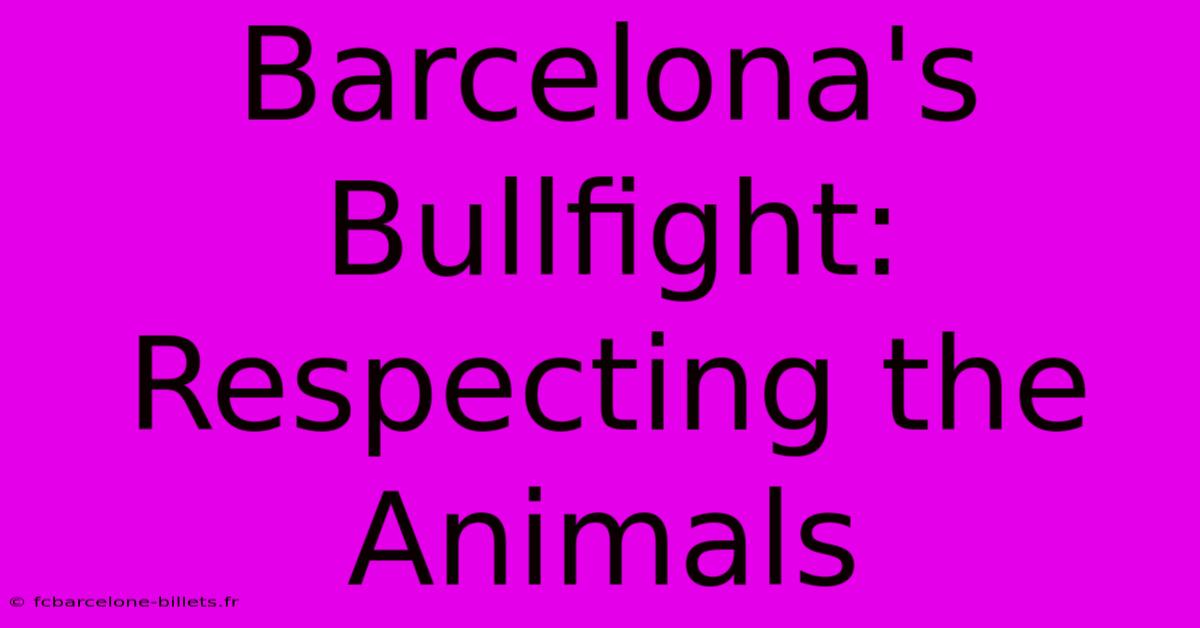Barcelona's Bullfight: Respecting The Animals

Table of Contents
Barcelona's Bullfight: Respecting the Animals
Barcelona, a city pulsating with vibrant culture and history, also holds a complex relationship with its traditional bullfights, or corridas de toros. While the spectacle remains a part of Spanish heritage, growing awareness of animal welfare has sparked intense debate, leading to the ban of bullfighting in Catalonia in 2010. This ban, however, hasn't silenced the discussion surrounding the ethics of the practice, and the need to respect the animals involved. This article delves into the heart of this debate, exploring the arguments for and against bullfighting in Barcelona, and highlighting the importance of animal welfare, regardless of cultural tradition.
The Tradition and the Controversy
Bullfighting in Spain, including Barcelona, boasts centuries of tradition, deeply entwined with its cultural identity. For many, it represents a rich artistic expression, a display of courage, skill, and artistry. The spectacle itself is a carefully choreographed ballet of death, where the matador's skill is tested against the power and unpredictability of the bull. However, this tradition clashes sharply with the modern understanding of animal welfare and the inherent cruelty associated with the event.
The Bull's Perspective
The core of the controversy lies in the bull's suffering. The animals, often young and raised specifically for the fight, endure immense pain and stress throughout the process. They are subjected to provocation, often with banderillas (barbed sticks) and picadors (lancers) weakening and agonizing them before the final, fatal blow. The argument that the bull lives a relatively natural life prior to the fight is often countered by animal rights activists who highlight the inherently stressful and unnatural environment these animals are raised in, specifically for the purpose of being killed.
The Human Perspective: Tradition vs. Morality
The defense of bullfighting often rests on the argument of tradition and cultural heritage. It's portrayed as an art form, a spectacle demanding skill and bravery from the participants. For generations, it has been a crucial aspect of Spanish identity, woven into the fabric of society. However, an increasing number of people find this justification insufficient, arguing that cultural traditions cannot excuse blatant cruelty to animals. The ethical question arises: Should the perpetuation of a tradition outweigh the suffering of sentient beings?
Beyond the Ring: Alternatives and a Path Forward
While the bullfight ban in Catalonia serves as a powerful symbol of changing attitudes, the debate continues. Instead of focusing solely on abolishing the practice, a more constructive approach involves exploring alternatives that honor tradition while minimizing animal suffering. This might include promoting corridas de rejones (bullfights on horseback) where the bull is less violently attacked, or completely replacing the event with symbolic performances or artistic representations that honor the spirit of the tradition without causing animal harm.
The Growing Movement for Animal Welfare
The international animal welfare movement plays a significant role in the ongoing discussions. Organizations like the RSPCA and similar groups actively campaign against practices that cause animal suffering, raising public awareness and advocating for stricter regulations and, ultimately, bans on events like bullfighting. Their work is contributing to a global shift in ethical perspectives towards animals, affecting not just bullfighting, but other traditions involving animal exploitation.
Conclusion: Respecting the Animals, Respecting Humanity
The debate surrounding Barcelona's bullfights touches upon fundamental ethical questions about our relationship with animals and the balance between cultural preservation and moral responsibility. While the ban in Catalonia represents a significant victory for animal welfare advocates, the broader discussion persists. Respect for animals is not simply a matter of sentimentality, but a reflection of our values and humanity. Moving forward, finding alternatives that honor tradition without sacrificing animal welfare is a crucial step in creating a more ethical and compassionate future. The conversation needs to continue, focusing not just on banning the practice, but on promoting a more responsible and humane approach to animal treatment.

Thank you for visiting our website wich cover about Barcelona's Bullfight: Respecting The Animals. We hope the information provided has been useful to you. Feel free to contact us if you have any questions or need further assistance. See you next time and dont miss to bookmark.
Featured Posts
-
Bayern Munichs Standings The Barcelona Threat
Apr 02, 2025
-
Invest In Barcelona Real Estate Luxury Condos Available
Apr 02, 2025
-
Unlock Barcelonas Secrets Grand Prix Map And Hidden Gems
Apr 02, 2025
-
Barcelonas Secret Spots Rooftop Pool Hotel Retreats
Apr 02, 2025
-
Bank Holidays In Barcelona Things To Do With Kids
Apr 02, 2025
